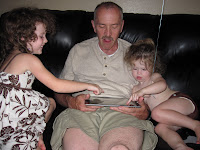It’s Christmas Day!
And, in many homes the baby Jesus will be placed in the manger. In ours, like many others, the Christmas story from Luke 2 will be read.
In all of time—since time began, the triune God planned for this day—when the Godhead would split and in a unique and temporary way, no longer be one in the quite the same way.
Can I understand such an event? I cannot.
But, perhaps, when one has loved another for so long and so deeply—who is no longer here—maybe, just maybe—that one has the tiniest intimation of something so outrageous—maybe.
I don’t know what was happening all those months in Mary’s womb, but there came the moment of birth and God, very God, entered our world.
The angels sang, the shepherds watched, the wisemen worshiped, Herod plotted, Joseph protected, Mary pondered, and the Creator became the created, of a sort.
And should the Savor of the world not come as a babe—the very symbol of hope in a heavy, weary world?
For Mary there would be days to ponder, days to forget, and days to weep.
For Jesus there would be days to submit, days to love and instruct, a day to die, and a day to reclaim His glory once more.
Wisemen look for a Savior and wisemen still find Him—
Is there any better place to find Him than in the lives of us who bear His name?
Happy Christmas, all!



















